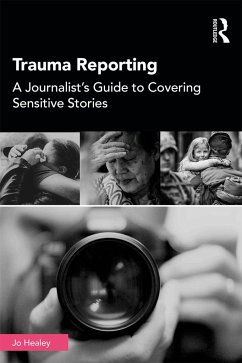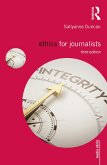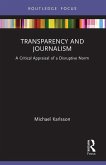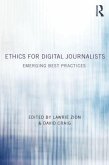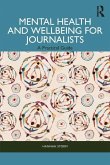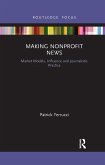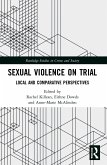Trauma Reporting provides vital information on developing a healthy, professional and respectful relationship with those who choose to tell their stories during times of trauma, distress or grief.
Amid a growing demand and need for guidance, this fascinating book is refreshingly simple, engaging and readable, providing a wealth of original insight. As an aspiring or working journalist, how should you work with a grieving parent, a survivor of sexual violence, a witness at the scene of a traumatic event? How should you approach people, interview them and film with them sensitively? Trauma Reporting features guidance from some of the industry's most successful news correspondents and documentary makers, including Louis Theroux, Lucy Williamson, Tulip Mazumdar, Richard Bilton, Jina Moore and many more, all sharing their experience and expertise. It also features people who chose to tell their sensitive stories to journalists, giving readers invaluable insight intowhat helped and what harmed.
The book also includes:
What your interviewees may be going through and how best to respond, by trauma expert Professor Stephen Regel.
A discussion on ethics, rules and regulations by Dr Sallyanne Duncan of the University of Strathclyde.
Making sure you look after yourself, by Dr Cait McMahon of the Dart Center for Journalism and Trauma.
Insightful and innovative, this book is essential for new and established journalists across all media, students of journalism and broadcasting, and anyone who wishes to share the stories of those affected by trauma.
Amid a growing demand and need for guidance, this fascinating book is refreshingly simple, engaging and readable, providing a wealth of original insight. As an aspiring or working journalist, how should you work with a grieving parent, a survivor of sexual violence, a witness at the scene of a traumatic event? How should you approach people, interview them and film with them sensitively? Trauma Reporting features guidance from some of the industry's most successful news correspondents and documentary makers, including Louis Theroux, Lucy Williamson, Tulip Mazumdar, Richard Bilton, Jina Moore and many more, all sharing their experience and expertise. It also features people who chose to tell their sensitive stories to journalists, giving readers invaluable insight intowhat helped and what harmed.
The book also includes:
What your interviewees may be going through and how best to respond, by trauma expert Professor Stephen Regel.
A discussion on ethics, rules and regulations by Dr Sallyanne Duncan of the University of Strathclyde.
Making sure you look after yourself, by Dr Cait McMahon of the Dart Center for Journalism and Trauma.
Insightful and innovative, this book is essential for new and established journalists across all media, students of journalism and broadcasting, and anyone who wishes to share the stories of those affected by trauma.
'It is absolutely fundamental that journalists treat vulnerable contributors sensitively and with respect.'
- Louis Theroux
'Dealing with personal tragedy is hard enough but dealing with the media often compounds the pain, trauma and powerlessness of uninvited experiences. It doesn't have to be like that. The insight and the guidance in this book reflect compassionate, ethical and professional practices that can only benefit journalists as well as those they work with and for.'
- Anne Eyre, Disaster Action.
'Full of vital, sensible and practical advice. All journalists, especially those just starting out on their careers, would benefit from absorbing this clear, thoughtful and much-needed guide.'
- Adam Bullimore, Editor, BBC Breakfast News
'Families we have supported tell us the way they are treated by the media can have a massive impact on them. We welcome the level-headed and practical advice in this important book which will increase the confidence of reporters and reduce any unnecessary distress for families.'
- Child Bereavement UK
'The scoop-obsessed, noisy hack pack, forever ready to pounce mercilessly on unsuspecting people suddenly thrown into the media spotlight, is a stereotype beloved of Hollywood and television detective series. Countering that image, Jo Healey, drawing from wide-ranging interviews, academic studies and her own experience, shows that there is, indeed, a large, caring and reflective community of print and broadcast journos who strive hard to work sensitively when dealing with vulnerable children and adults - and with people suffering from all kinds of trauma. Healey also records moving testimonies from people who, following some tragedy, have had to face the hack pack at their door. Both students and practicing journalists will find this text - packed with sensible and always clearly presented advice - of enormous, lasting value.'
- Richard Lance Keeble, University of Lincoln and Liverpool Hope University
- Louis Theroux
'Dealing with personal tragedy is hard enough but dealing with the media often compounds the pain, trauma and powerlessness of uninvited experiences. It doesn't have to be like that. The insight and the guidance in this book reflect compassionate, ethical and professional practices that can only benefit journalists as well as those they work with and for.'
- Anne Eyre, Disaster Action.
'Full of vital, sensible and practical advice. All journalists, especially those just starting out on their careers, would benefit from absorbing this clear, thoughtful and much-needed guide.'
- Adam Bullimore, Editor, BBC Breakfast News
'Families we have supported tell us the way they are treated by the media can have a massive impact on them. We welcome the level-headed and practical advice in this important book which will increase the confidence of reporters and reduce any unnecessary distress for families.'
- Child Bereavement UK
'The scoop-obsessed, noisy hack pack, forever ready to pounce mercilessly on unsuspecting people suddenly thrown into the media spotlight, is a stereotype beloved of Hollywood and television detective series. Countering that image, Jo Healey, drawing from wide-ranging interviews, academic studies and her own experience, shows that there is, indeed, a large, caring and reflective community of print and broadcast journos who strive hard to work sensitively when dealing with vulnerable children and adults - and with people suffering from all kinds of trauma. Healey also records moving testimonies from people who, following some tragedy, have had to face the hack pack at their door. Both students and practicing journalists will find this text - packed with sensible and always clearly presented advice - of enormous, lasting value.'
- Richard Lance Keeble, University of Lincoln and Liverpool Hope University

